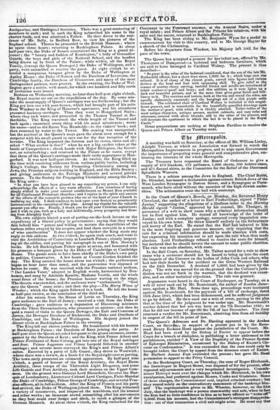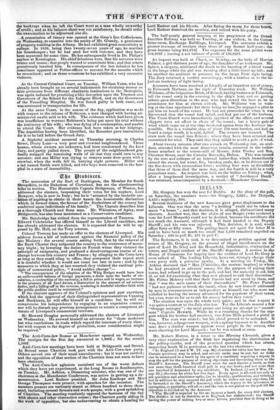gbe Inetropolis.
A meeting was held on Saturday, at the offices of Mr. William Linley, Adelphi Terrace, at which an Association was formed to watch the Metropolitan Improvements in progress, and to urge upon Government the importance of preparing some general and comprehensive plan, em- bracing the interests of the whole Metropolis.
The Treasury have requested the Board of Ordnance to give a supply of 678 blankets, 173 palliasses, 1,000 sheets, 500 bolster-cases, and 471 flannel shirts, to the Committee for the Relief of the Distressed Spitalfields Weavers.
There is a schism among the Jews in England. The Chief Rabbi, Dr. Hirschel, has issued a declaration against certain British Jews of the West London Synagogue in Burton Street, and a Synagogue at Ports- mouth, who have acted without the sanction of the high Jewish autho- rities. The schismatics treat the bull with contempt.
In the Court of Queen's Bench, on Monday, the Reverend Henry Cleveland, the author of a letter to Earl Fitzhardinge, signed " Philo- Junius," supporting the allegations of a libellous letter in the Morning Herald signed "Junius," appeared by his counsel, Mr. Thesiger, in pursuance of a writ to show cause why a criminal information should not be filed against him. He denied all knowledge of the letter of Junius; and with a complete apology, retracted every imputation con- veyed in his own letter. He threw himself entirely on the forbearance and mercy of the Earl. He stated that the Earl had behaved to him in the most forgiving and generous manner, only requiring that the rule for a criminal information should be made absolute with costs, but expressing his intention not to act upon the rule when thus made absolute. Lord Fitzhardinge refused to receive the costs for himself, but declared that he should devote the amount to some public charities. The rule was made absolute, with costs.
In the Bail Court, on Saturday, Mr. Talbot moved for a rule to show cause why a certiorari should not be issued to bring up into the court the inquest of the Coroner on the bodies of John Cook and others, who had met their deaths by the accident on the Great Western Railroad on the 24th December. A deodand of 1,000/. had been given by the Jury. The writ was moved for on the ground that the Coroner's juris- diction was not set forth in the warrant, that the deodand was exces- sive, and on other technical objections. The rule was granted.
Arguments were heard in the Court of Exchequer, on Tuesday, on a writ of error sued out by Mr. Bourcicault, the author of London Assur- ance, against a Mr. Hart. Some time ago, proceedings were instituted against Mr. Bourcicault, for the payment of a bill of exchange, dated 15th June 1841, which had been dislonoured, and he suffered Judgment to go by default. He then sued out a writ of error, putting in the plea that at the time of the judgment be was under age. Mr. Bourcicault's mother delared that her son was born on the 7th December 1820; so that he did not become of age till the 7th of last December. The Jury returned a verdict for Mr. Bourcicault, absolving him from all liability in respect of the bill in point of law.
The Queen's Advocate and Dr. Harding appeared in the Arches Court, on Sat today, in support of a protest put in by the Reve- rend Henry Etskine Head against the jurisdiction of the Court. Mr. Head had been cued by the Bishop of Exeter to appear before the Court for a breach of discipline, in publishing a letter addressed to his parishioners, entitled " A View of the Duplicity of the Present System of Episcopal Ministration, occasioned by the Bishop of Exeter's Cir- cular on Confirmation." It was contended that the case could only be brought before the Court by appeal from the diocesan court of Exeter. Sir Herbert Jenner Fust overruled the protest; but gave Mr. Head permission to appeal to the Privy Council.
In the Bankruptcy Court, on Thursday, the case of Roger Hitchcock, the linendra per in Regent Street, was disposed of for the present, after repeated adjournments and a very lengthened investigation. Commis- sioner Holroyd went over the charges which Mr. Hitchcock, in his own exculpation, had preferred against Messrs. Cooke and Gladstone. Some of those charges, the Commissioner said, implied criminal conduct ; but they rested solely on the contradictory statements of the bankrupt him- self The representation given to Mr. Wheeler, however, on the 21st July, that the bankrupt was a person trustworthy and safe, when in fact the firm had so little confidence in him as to have offered to " write off" 2,500/. from his account, had the Commissioner's strongest disapproba- tion: out of that transaction a civil suit might arise. He must say that the bankrupt when be left the Court went as a man wholly unworthy of credit ; and as his balance-sheet was not satisfactory, he should order the examination to be adjourned sine die.
A commission of lunacy was opened at the Gray's Inn Coffeehouse, on Wednesday, to examine into the sanity of Mr. Grundy, a gentleman of property residing in the Albany. He had exhibited great eccentricity at college. In 1839, being then twenty-seven years of age, he married his housekeeper ; but he had used her with violence, and they have been separated for some time. He has subsequently lived in Dr. Philps's asylum at Kensington. His chief delusions were, that his servants were brutes and beasts ; that people wanted to assassinate him ; and that others gratuitously insulted him. In consequence of the last delusion he has sometimes appeared at Police-offices to account for the assaults which he committed ; and on those occasions he has exhibited a very eccentric violence.
At the Central Criminal Court, on Tuesday, William Yates, who has already been brought up on several indictments for obtaining money on false pretences from different charitable institutions in the Metropolis, was again indicted for practising alike deception upon the Trustees and Governors of the School for the Indigent Blind, and on the Governors of the Foundling Hospital. He was found guilty in both cases, and was sentenced to transportation for life.
At the same Court, in the course of the day, application was made with respect to the release of Robinson, a man charged with having ad- ministered oxalic acid to his wife. The evidence which had been given was insufficient to warrant Robinson's being put upon his trial without the testimony of his wife ; who was dying of a consumption, and unable to attend the Court. Her evidence had been taken at her lodgings. The deposition having been identified, the Recorder gave instructions for it to be laid before the Grand Jury.
A frightful accident occurred on Thursday morning, in Charles Street, Drury Lane—a very poor and crowded neighbourhood. Three houses, whose owners are unknown, had been condemned by the Lest Jury, and partly pulled down. The people of the neighbourhood gra- dually stripped the remaining walls of all that they could turn to any account; and one Miller was trying to remove some door-posts with a crowbar, when the walls fell in, burying eight persons. Miller and a lad named Smith were killed, and two'boys were removed to the hos- pital in a state of insensibility.



























 Previous page
Previous page